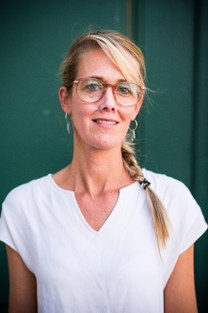Geertrui Daem
Bio
Geertrui Daem studied Law in Ghent and Aix-en- Provence (2003) and holds an additional Master in Conflict and Development (2004).
After practicing three years as a lawyer specialized in migration and asylum law at the Antwerp Bar, Geertrui Daem moved to Algeria (Algiers) where she worked for the UN Refugee Agency (UNHCR) as a Refugee Status Determination Officer for two years.
Afterwards, she took up short positions as a legal officer for the Flemish Refugee Action (Vluchtelingenwerk Vlaanderen) and the Belgian Refugee Council (now Nansen vzw). Geertrui Daem was also an independent consultant for UNHCR Brussels and conducted, as a national expert for Belgium, research for the report “Safe at last”, a comparative study regarding requests for subsidiairy protection in the EU.
In 2011, she moved to Kenya (Nairobi) for one year, where she was employed as Resettlement Officer for UNHCR. Between 2012 and 2016, Geertrui Daem worked as a legal officer for the Belgian Refugee Council (now Nansen vzw) where she provided legal support to numerous asylum seekers.
From 2016 until 2021, Geertrui Daem worked as a legal officer for the Flemish Agency for Integration and Civic integration with a particular focus on asylum and civic integration.
In October 2021, she started at the Institute for Private International Law at Ghent University, where she is working on a PhD entitled “Refugees in identity crisis". She is particularly interested in migration law, private international law and human rights law.
Research project
Refugees in identity crisis
Imagine: a Somalian boy cannot prove his minority in order to be entitled to a guardian because he has no birth certificate. Or: an Afghan couple, claiming for asylum, whose Iranian marriage certificate proves a religious marriage that was concluded in Iran when the girl was 16. A Syrian refugee wants to prove his fatherhood but his child was born in a Lebanese refugee camp and misses a birth certificate. How shall their personal status be recognized in this migration context? These cases share a complex legal dimension related to the cross-border recognition of personal status. Not only do refugees have to submit authentic documents, the content of the documents must also be recognized. Both issues are important hurdles in a refugee context. Since the interactions between private international law and migration law are insufficiently considered, refugees and their families not only suffer from difficult living conditions but also from identity crises as they are trapped in a serious legal limbo; e.g. married in Iran, but not in Belgium.
The research will empirically investigate these pressing legal issues in a Belgian context. To this end, asylum authorities, administrative and judicial authorities will be interviewed and roundtables with lawyers will be organised. An online survey addressing these stakeholders will offer further insight in the legal problems refugees encounter relating to their personal status.
Through this methodology, the research aims at mapping the legal problems related to their personal status. In a second phase, it will investigate whether and how the mapping and how the awareness of these interactions between migration law and private international law can lead to a better coordination of these two legal frameworks with the aim of enhancing the protection of refugees.
